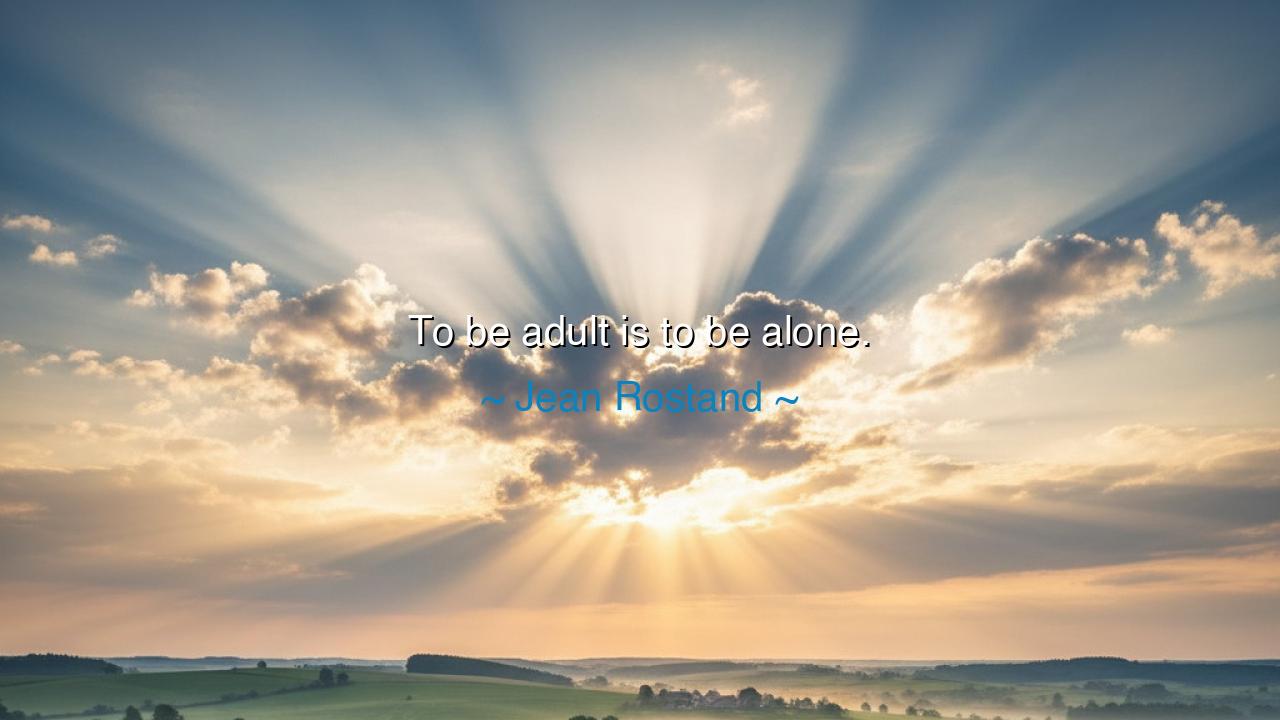
To be adult is to be alone.






"To be adult is to be alone." These profound words by Jean Rostand challenge us to confront one of the most essential truths of human existence. The adult life, in all its complexity, requires a kind of solitude that is not merely physical but emotional and intellectual. As we age, we become increasingly responsible for our own choices, our own beliefs, and our own destinies. This independence, while liberating, also carries a loneliness that marks adulthood. It is in our maturity that we are most alone—not in the sense of isolation, but in the deeper, more existential sense of facing the world on our own terms, without the constant crutch of others’ influence or guidance.
In ancient times, wisdom was often regarded as something that came with age and experience, but it also came with the recognition of solitude. Socrates, for instance, was known for his deep reflection on life, seeking truth not from the noise of the world, but from within himself. Though surrounded by students and followers, Socrates often found his greatest clarity in solitary contemplation. His understanding of life was not rooted in the comfort of others, but in the solitude that allowed him to engage with the inner world, to grapple with the great questions of existence. In this way, Socrates exemplifies the truth that adulthood—true adulthood—is forged in solitude, where we must confront our own thoughts and decisions without the influence of others.
Consider also the story of Alexander the Great, whose military campaigns were marked not only by external victories but by profound solitude. Though he commanded vast armies, Alexander often faced personal doubts and struggles. His pursuit of conquest was as much a journey inward as it was outward. The act of ruling, of making decisions that affected the lives of thousands, left him with an intensity of isolation that few could understand. Even at the height of his power, he was often confronted with the crushing responsibility of leadership, which left him separated from those he ruled and loved. In his story, we see that adulthood—especially the burdens of power and responsibility—brings with it a deep loneliness that is part of the human condition.
The concept of adulthood as solitude is also reflected in the teachings of the Stoics, who recognized that true peace comes from within. Epictetus, a Stoic philosopher, taught that while we cannot control the world around us, we can control our own reactions to it. In this sense, solitude is not a state of sadness but a state of empowerment, where we are free to engage with life on our own terms. The Stoics understood that as we grow, we must come to terms with the fact that external validation and companionship can never fully satisfy our deeper longings. It is only through self-reliance and inner peace that we can navigate the world as true adults.
Rostand’s insight into adulthood and solitude reveals that maturity comes not with the avoidance of loneliness but with the embracing of it. It is not a rejection of others but an acknowledgment that inner strength and clarity come from facing the world independently. The shift from childhood to adulthood is often marked by the gradual realization that we cannot always rely on others for direction or comfort. It is the courage to face the world alone, without the constant guidance of others, that marks our journey to maturity. This recognition of solitude as a space for growth is both a challenge and a gift.
The lesson here is clear: adulthood requires us to embrace the solitude that comes with maturity. It is not a loneliness to be feared but a solitude that offers the opportunity for self-discovery and independence. Just as Socrates and Epictetus found peace in their own minds, we must learn to navigate the world with confidence in our own judgment and values. To be an adult is not to be isolated from others, but to stand firm in our own identity, free from the need for constant external validation.
Practical action, then, is to seek moments of solitude in our lives—whether through meditation, journaling, or simply spending time in quiet reflection. By carving out space for ourselves, we create opportunities for growth and clarity. In these moments of solitude, we can reconnect with our inner selves, assess our values, and make decisions that reflect who we truly are. Solitude is not the absence of others, but the presence of self—an opportunity to build the resilience and strength that will carry us through life’s challenges.
In conclusion, Jean Rostand’s reflection on adulthood and solitude reveals a universal truth: the path to maturity is not marked by the avoidance of loneliness, but by the embracing of it. Like the great philosophers and leaders who came before us, we must learn to stand alone, to find inner peace, and to face the world with a quiet confidence that comes from knowing who we are. Only through this solitude can we truly grow, for it is in the quiet spaces of our lives that we find the strength to become who we were always meant to be.






AAdministratorAdministrator
Welcome, honored guests. Please leave a comment, we will respond soon